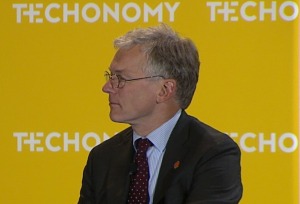by
Gus Iversen, Editor in Chief | December 14, 2016
In an exclusive interview, Frans van Houten, CEO of Royal Philips, spoke to HCB News about a wide range of topics pertaining to RSNA and the future of medical imaging.
From the evolving role of radiologists to a comparison between software innovation and hardware innovation, to the political situation in the U.S. and its global implications for value-based care. Here, lightly modified for cohesiveness and clarity, is our conversation:
HCB News: For Philips, in what ways was this year's RSNA different from previous years?



Ad Statistics
Times Displayed: 365912
Times Visited: 7103 Quality remanufactured Certified Centrifuges at Great prices! Fully warranted and backed by a company you can trust! Call or click for a free quote today! www.Centrifugestore.com 800-457-7576
Frans van Houten: For us, RSNA this year was very much focused on clinical informatics that bring the health continuum together.
We introduced
solutions for more integrated care pathways supported by clinical analytics, and showed how artificial intelligence applications can make radiologists much more productive. For example, to do longitudinal cancer tumor assessment over multiple modalities — whether PET, CT, X-ray, MR or ultrasound, from any vendor — we can go through the longitudinal records of a patient and automatically quantify how the tumor is evolving.
It was an RSNA where we showed that data can be made actionable. In the past, RSNA has been about image acquisition through scanners. We still do that but besides great acquisition devices, we’ve demonstrated we can also generate data specific to a patient and make the doctor more productive, and free-up time to be more patient-centric.
The reaction from radiologists can vary. Some fear that machines will take over their tasks while others can see that these innovations are helping to determine the best way to treat the patient. Obviously we believe the latter — and that this will be the norm in the future.
HCB News: What do you tell those radiologists who are worried about becoming obsolete?
FVH: I think that fear is wrong. Clinical informatics can take over routine tasks and quantification, and free up time so radiologists can be more productive and see more patients. The picture we paint is one where there will be an emerging role for a chief clinical data scientist.
Who is bringing together the data from these various fields? You need custodianship and stewardship over all that data and then to interpret it, in order to come to a definitive diagnosis.
What is statistically the treatment pathway that has the best possible outcome? I think that is where doctors will spend more time in the future, rather then in the dark room manually measuring how many millimeters the tumor has evolved.

